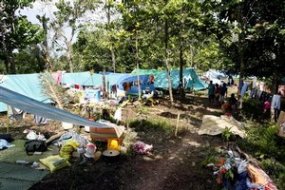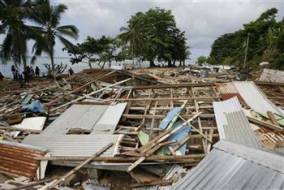When a deadly tsunami swept through the western region of the Solomon Islands on April 1, causing widespread damage throughout the many coastal areas, the Adventist Development and Relief Agency (ADRA) responded immediately, providing urgently needed supplies to families as they begin rebuilding their lives.
A state of emergency was declared the following day after an underwater earthquake measuring 8.1 on the Richter scale triggered the 33-foot tsunami. The earthquake lifted an entire island by three metres, exposing coral reefs that are now dying. More than 32 people are so far thought to have been killed, 100 people are still missing and an estimated 5,500 people are currently displaced. Almost half of the 100,000 people living in the Western and Choiseul provinces are thought to have been affected by the tsunami. In the two provinces there are mostly Christians living, who belong to the United Church [Methodist], Roman Catholic Church, Seventh-day Adventist Church and the Christian Fellowship Church. There are also some small Anglican congregations.
ADRA is coordinating its assessment and response with the local government, UN agencies, and other international nongovernmental organizations, which are providing essential health care, equipment, supplies, and resources. Other needs include mosquito nets, tents, storage tanks and containers for potable water, cooking utensils, gardening and fishing tools, and construction materials. These non-food items will help survivors re-establish their livelihoods.

Based on ADRA’s assessment, it is distributing emergency supplies to an estimated 168 families, or approximately 1,000 people, in the coastal areas of the Choiseul, Ranongga, and Vella La Vella islands. Each emergency kit contains construction tools, nails, plates, cutlery, and a set of cooking pots, according to minimum international standards. Because of the tsunami’s impact on agricultural production and people’s household gardens, ADRA is also supplying basic tools needed to harvest the root crops commonly grown on the islands.
While meeting the immediate needs of the survivors, ADRA is also assessing the long-term needs of the community to determine the scope necessary for a rehabilitation project that can address the water and sanitation requirements of the targeted communities. ADRA has appealed to private donors for help with immediate needs as well as long-term needs.
Teams of local volunteers are assisting in the initial emergency distribution to each particular island and are travelling to assist targeted families by canoe and boat, with some journeys taking up to two hours. ADRA is working directly with the local population to distribute, monitor, and manage the intervention.
"Trips between islands represent a common and ordinary way of life for local staff and volunteers, who are more than willing to assist in the distribution. ADRA boats will possess appropriate safety equipment including life jackets, EPURB locators [electronic positioning beacons], and a GPS with nautical maps," says Chris Jensen, international programs manager for ADRA Australia.
Priority selection is determined based on need, focusing primarily on families who have lost the most basic tools to rebuild their homes and the ability to provide for their family’s basic cooking and hygiene requirements.
The project is co-funded by ADRA Australia, ADRA New Zealand, and ADRA International.
ADRA is present in 125 countries, providing community development and emergency management without regard to political or religious association, age, gender, or ethnicity.

